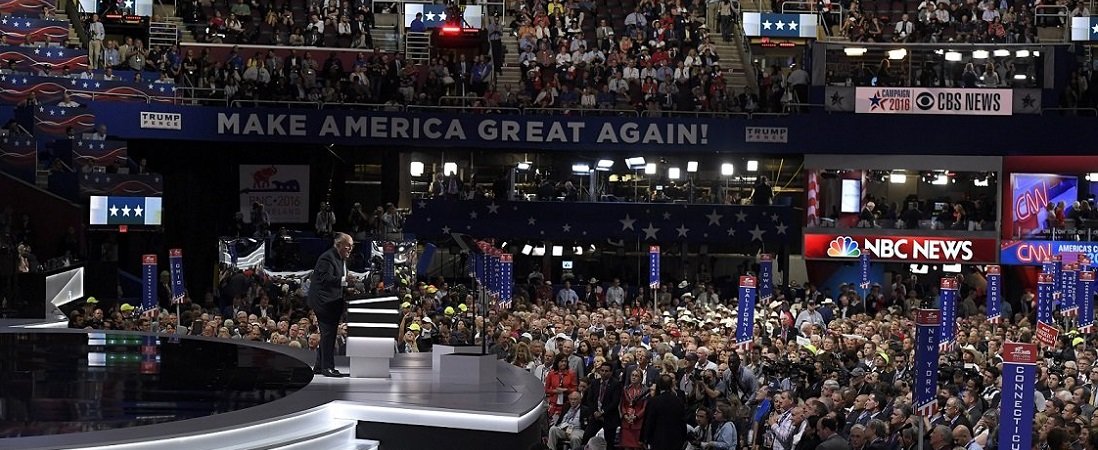With the Republican National Convention underway, the United States is bracing itself for what may come. This election year has left many political observers in disbelief, questioning their grasp on the American psyche. It also presents a wealth of important narratives through which to discuss the presidential election, which is about to shift into high gear (as if we weren’t all exhausted already). However, news coverage of the convention seems focused on something else entirely: the spectacle of the presumptive nominee, Donald Trump.
Networks news could focus on the utter loss of control by the Republican political establishment, which has lead some to predict the end of the GOP—or at least the replacement of the party of Lincoln and small government with one based on cultural divisions and xenophobic nationalism.
There is the notable fear of violence at the convention. The GOP’s advocacy for gun ownership and open carry laws makes security a challenge. Tensions are high following the killing of two black men at the hands of police, protests against police brutality, and two attacks on police in the past 10 days that left eight officers dead. This is before one even considers the possibility of an Islamic State-inspired attack like those that have rocked Orlando, Florida and Nice, France in recent weeks.
Furthermore, there is also the fact that after some hoped that Trump might influence the GOP in a moderate direction, the party produced what some are calling the party’s most conservative platform in decades. Despite a Supreme Court ruling this year legalising gay marriage, the platform continues to define marriage as between a man and a woman. It promotes religious liberty as a justification for discrimination, supports conversation therapy as a cure for homosexuality, and even refuses to recognize LGBT people as a group threatened by Islamic State. The 2016 GOP platform also clarifies support for Donald Trump’s wall on the Mexican border, calls for the elimination of national parks, refers to coal as “clean energy”, and names pornography as a “public health crisis” while refusing to recognise gun violence as an issue.
These are just a few of the countless angles that news organisations could use to frame the convention. However, in reviewing the promo spots that were rolled out in the preceding days, it is obvious that their focus is somewhere else entirely. It revolves around Donald Trump’s celebrity and breathless anticipation of his next sound bite.
This CNN spot says it all. It gives the impression that Trump is reprising his role on WWE Wrestlemania this week rather receiving a major party nomination for president and the momentous responsibility that goes with it. While not much better, Fox News and NBC at least feature their on-air personalities rather than devolving into a blatant promotional spot for Trump. The only network that seems to take a serious (and reassuring) approach to the convention is the publicly funded and seldom watched PBS.
The national party conventions are about entertainment. They are events designed to coalesce support for a nominee and motivate party activists to work for them during the months of campaigning to come. However, that is for the GOP itself to indulge in. These TV spots, and the circus that they seem to promote, are produced by the news networks that should be pushing past the crowds and the balloons to examine what the convention means for the country.
Trump is reported to have benefitted from over 2 billion dollars worth of free media during the primary as the networks clamored to cover his ratings inflating bravado and inflammatory rhetoric. Their focus on entertainment value rather than political coherence may be more responsible than any other factor for the fact that the GOP has a nominee, who is disinterested in policy and disliked by 7 in 10 Americans. It appears that they are all doubling down on the general election.
This gets to the core of the problem with US politics. Citizens are increasingly entertained, rather than informed. News shows are light on facts and analysis, but offer flashy graphics and stories that convert partisanship into ratings. It begs a question, which we have also been asking ourselves in the wake of the UK vote to leave the EU, driven by a “leave” campaign that was rife with misrepresented facts and emotional appeals. What role do facts actually play in politics today? Is there enough space for them in a ratings-driven news environment like the one that has allowed Trump to take the Republican Party by storm?
As the election plays out over the next several months, the answers to these questions may have profound repercussions for the state of American democracy and the world that it influences.

